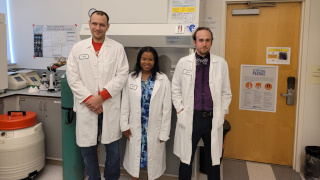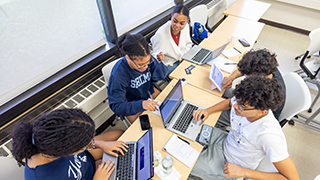NSF I-Corps Program Advances Students’ Entrepreneurship - Seton Hall University
Friday, September 23, 2022

Alumnus Robert Tancer, Ph.D. '22 and Charnette Frederic, M.H.A. '11/Ph.D. '23 recently completed the National Science Foundation’s Innovation Corps (I-Corps) program, an immersive, experiential training program that prepares scientists and engineers to extend their focus beyond the laboratory and move toward commercialization.
Over four weeks, Tancer and Frederic learned how to assess and market the potential of their individual research projects and received hands-on experience in customer discovery – a critical step in the entrepreneurial process that involves talking to potential customers, partners and other industry stakeholders.
Together, Tancer and Frederic applied their learnings in real-time, taking the business and marketing concepts learned during education sessions straight into conversations with potential customers – individuals who ranged from nurses working in the field to public health officials involved in the tracking and progression of infectious diseases.
"The selected undergraduate and graduate students become Entrepreneurial Leads for their projects," commented Assistant Professor Gregory Wiedman, Ph.D., who supported Tancer and Frederic’s I-Corps application and worked with them as their Technical Lead during the program’s duration. "The students drive the discussion with customers, participate in the program and ultimately, apply what they’ve learned to future efforts and initiatives,"
Both actively involved in Professor Wiedman's 3B Lab, the pair based their experiential learning on Tancer’s doctoral dissertation, in which he developed a lead compound peptide antifungal drug that could provide an improved way to treat the highly-drug registrant pathogen, Cryptococcus neoformans.
Tancer and Frederic also received counsel and guidance from an advisor and fellow directly involved with the NSF, Michael Craig, Ph.D., their Co-Entrepreneurial Lead. This networking opportunity was another added benefit of the program, which exposes students to work being done across other institutions in their regional I-Corps Hub.
Each hub is a partnership of higher education institutions within a distinct geographical region that collaborate and explore the commercial potential of their technologies. Groups from Seton Hall University will participate in the I-Corps Northeast Region Hub, which includes Rutgers, Princeton, Drexel, MIT and others among its partner institutions.
Students interested in the I-Corps program are encouraged to apply and are welcome to reach out to Professor Wiedman for assistance. Details and more information can be found on the NSF I-Corps Program website.
Categories: Nation and World, Research, Science and Technology






